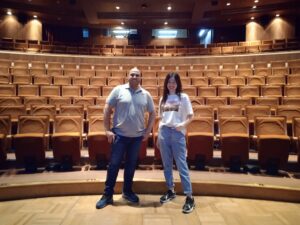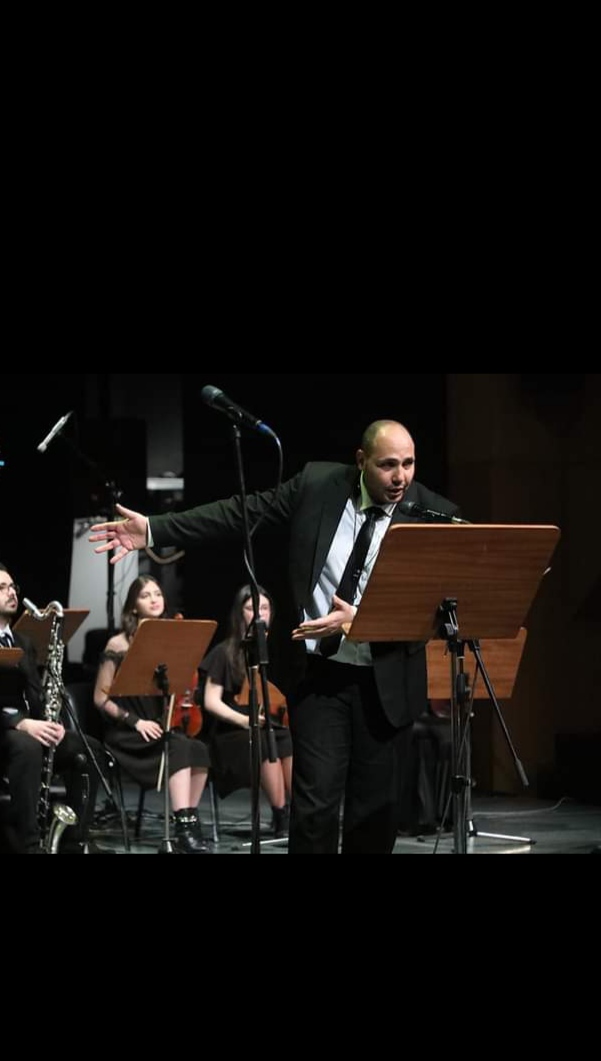I have always asked myself, why don’t we see Syrian musicians playing in the streets of the capital Damascus ?!
Syriatimes had a meeting with Maestro Dulamah Shehab ,a trumpet and saxophone player and the director of two jazz bands (Damascus Jazz band) and (Brass Temper band).
 I have always dreamt and asked myself why don’t we see musicians playing different instrument such as violin,guitar, oud or even the flute, showing their talents and capabilities in the streets of capital Damascus, adding life and aesthetics to it , like imagine walking down the street plagued with problems and thoughts , and all of a sudden you hear the sound of the violin reaching your ears as if the sad melody is talking to you , trying to tell you are not alone buddy !.. But as soon as we dive deeper in our daydreaming, reality comes back to wake us up with many answers and thoughts arising to why those things don’t happen in reality!
I have always dreamt and asked myself why don’t we see musicians playing different instrument such as violin,guitar, oud or even the flute, showing their talents and capabilities in the streets of capital Damascus, adding life and aesthetics to it , like imagine walking down the street plagued with problems and thoughts , and all of a sudden you hear the sound of the violin reaching your ears as if the sad melody is talking to you , trying to tell you are not alone buddy !.. But as soon as we dive deeper in our daydreaming, reality comes back to wake us up with many answers and thoughts arising to why those things don’t happen in reality!
The project of Jazz, how did Maestro Dulamahshehab make it happen?!
How did he bring jazz music back into theSyrian theaters through his two bands: Damascus jazz band and brass temper band?
Jazz is a western music that originated from African-American societies ,inside of my mind I have this picture of it that I had from American movies where jazz is always associated with bars, dim yellow lights and clouds of smoke , the way I perceived it made it feel strange for my liking , but the plot twist was when I heard Damascus Jazz and temper brass bands playing online I was amazed to like it , and that made me understand not to judge too fast or maybe they chose the right pieces of jazz to play , I don’t know !but still it taught me a lesson.
That’s why let’s get to discover how these two Jazz bands started in Syria …
Maestro DulmahShehad told us how it all started for him going back to his first steps in the world of music in 2005 where he started off as a trumpet player in the Syrian Jazz Orchestra, which was founded by Syrian and foreign musicians. Its first concert was held in the Citadel of Damascus at the time, it kept on until 2011 coinciding with the Syrian war which resulted in many of its musicians, who were more than fifty, to leave the country ,ending the band’s activities with it. The maestro added that at that time, meaning , before 2011, many events and festivals were held, where participants from different countries was active due to the presence of embassies and cultural centers concerned with sending invitations to professional Syrian musicians to participate in various festivals, with that energy of openness and cultural exchange with other countries it brought many Syrian musicians the chances they need to work in the field of music as well as showing their talents and creativity in the best way possible at that time.
The dark phase :
With the advent of 2011, the year where the Syrian crisis began bringing with it a frustrating confrontation with reality, the end of festivals and events, the end of the Syrian Jazz Orchestra band , and the end of everything related to Jazz music in Syria , where before the Jazz festival in Syria was based on elite Syrian musicians and Western musicians who joined to participate in the festival, but all of that was over at that time, Maestro Shehab added.
Now the come back phase:
During the interview, Maestro Shehad recounted how he ended his musical activity with the end of the original jazz band in 2011 and that continued until 2018 where he decided to go back to music with the idea of bring the Jazz music back into Syria by starting a new Jazz band , that’s why the first thing he did was look for the rest of musicians that were left from the Syria Jazz Orchestra band .He found only 5 players left out of nearly 50 musicians , and he told them what he was up to and they agreed and it all started by picking a new name to the band which is now the Damascus Jazz Band, and that’s how Shebab made Jazz music resonate again in the theaters of Syria possible .
Damascus Jazz band first event was held in Mashrou Dummar district , as most of its audience are from the youth , that’s why when Maestro Dulamah wanted to bring it back , he thought about mixing Jazz music with Rock music as its closer to the liking of the youth at that time , to his surprise , the feedback was” why did you mix Jazz music with Rock , when we listen to Jazz music we want only Jazz ” as its ruining its individuality , that’s why he decided to come up with a new band where he can open Jazz music to other types of music as well different age groups can join it , and that’s how the Brass Temper band started.
Syriatimes asked Maestro Dulamh Shehab what is it that he wishes to see happening in the world of music in Syria ?
Maestro Dulamh answered :serious projects or cultural projects have no funding other than the Ministry of culture and state institutions. The problem is that they work within certain limits. They really give opportunities to everyone, but they are unable to adopt an integrated music project. This kind of adoption that we dream of needs large institutions to make it happen. As well as having the conviction and motivation to sponsor musical and creative projects in Syria.
At the end of the interview, I asked Maestro Shehab my favorite question which is why don’t we see Syrian musicians playing in the streets of the CapitalDamascus ?
Maestro Shehabanswered :
That was the case before 2011, indeed there was a project called Music on the Road done by the supervision of an association called Sada .This association was so similar to the ministry of culture in its function , as it took on youth related projects and presented them with the aim of raising the cultural level of Syrian society , but the association no longer exists.
He added ,if a musician wanted to play music in the streets on his own , he would need many approvals to make it possible, that’s why it’s unlikely to happen.
And that’s how daydreams end and we wake up to reality …
Syriatimes ,Leen Al Salman

